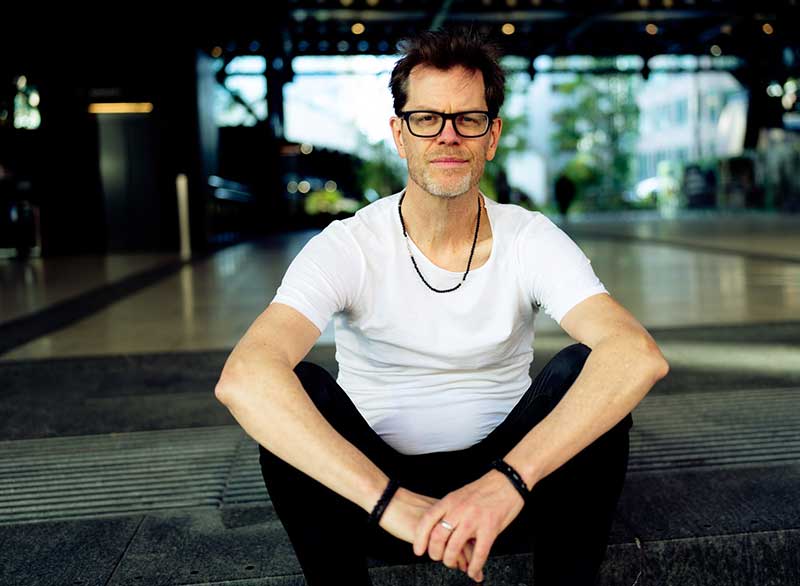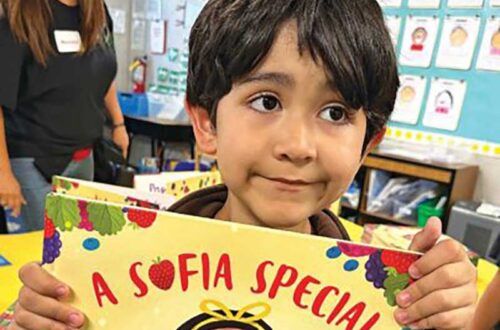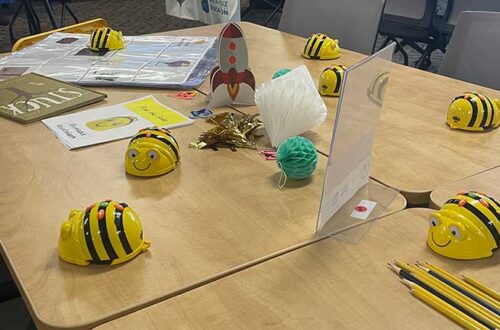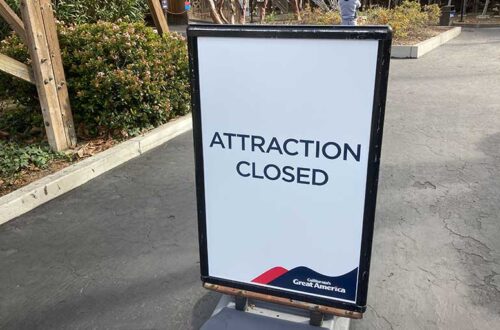
David Bowie’s Sax Player Finds Success After Aptos High
When Saxophonist Donny McCaslin and his New York-based band blazed through one of the best-received sets at the 66th Monterey Jazz Festival in September, McCaslin was standing on familiar turf.
As he told the audience at his Friday evening set on the West End stage, McCaslin has played the prestigious festival a number of times, starting at age 14. That year, McCaslin and his Aptos High School jazz bandmates won that year’s high school compeitition, and with it, a slot at the festival.
The effects-laden set McCaslin and his band played wasn’t the kind of music that would appeal to jazz purists, but it was atmospheric and high-energy, with plenty of dynamics and improvisational surprise.
If you wanted to design the perfect incubator for a jazz musician, it might look a lot like the Santa Cruz scene Donny McCaslin grew up in, circa 1980s. There was a percolating, local jazz marketplace in those days, with steady gigs for musicians, a renowned jazz program at Cabrillo College and in 1975, the opening of the Kuumbwa Jazz Center, providing an unshakeable stage for both local players and traveling icons.
McCaslin returns to familiar turf this weekend. Friday night at 7 p.m., He and his quartet will play the West End stage at the Monterey Jazz Festival. McCaslin played at the festival several times while still in high school. They’ll play music from his new Album “I Want More,” on Edition Records.
McCaslin’s late father, Don, was at the epicenter of the scene as a steadily gigging, dedicated pianist and vibraphonist who sometimes played as many as 13 gigs in a week, according to one former band member. Don McCaslin died of congestive heart failure in early 2020.
In those days, jazz people could hold down long-running, standing gigs, and Don McCaslin had a lot of them (according to a Good Times article from a few years ago): 17 years at the Cooper House before it was wrecked by the Loma Prieta earthquake, almost 20 years at the Wharf House in Capitola, and nearly 25 at Severino’s in Aptos. He also had long runs at the 2525 Club in Soquel, the old Bayview Hotel in Aptos, and the New Riverside in Capitola, along with steady bookings at places like the — Crow’s Nest, the Balzac Bistro, and many other clubs that live in memory.
The Santa Cruz nightclubs where his father’s bands worked regularly are long gone, for the most part. But Donny, now based in Brooklyn, has very early memories of going to his dad’s Cooper House gigs one day a week, “helping him set up and then sitting on the bandstand all day.”
He started learning the saxophone at age 12. Thinking back, McCaslin thinks his interest in the tenor sax might have been sparked by his father’s tenorman, Jesse Braxton, “a very charismatic player.” Once he made the choice he started taking lessons from the still-active sax player Brad Hecht and then Paul Contos, who has a prominent position in the education department at SF Jazz in the Bay Area.
Although McCaslin was not very old when his parents divorced, he has fond memories of his father bringing a Wurlitzer piano over to the Happy Valley home where Donny and his mother lived, and playing keyboard chords for Donny to practice over. He would do this on a weekly basis.
“My dad gave me so much info that was brand new to me, talking to me about players like John Coltrane and Michael Brecker, and I started exploring the jazz language.”
The younger McCaslin didn’t take long to achieve fluency. Living with his mother in Happy Valley after his parents divorced, McCaslin attended Aptos High School and got an early start with Aptos’ renowned jazz program, led by Don Keller. “He had all these Duke Ellington charts, bequeathed to him by Bill Berry, who had a big band in L.A. and toured with Ellington.” McCaslin auditioned with the jazz band at Cabrillo College and found he wasn’t ready yet, but soon after started participating in Cabrillo band rehearsals several days a week.
He also learned a lot in a combo class at the recently opened Kuumbwa Jazz. He also remembers seeing jazz titans like Elvin Jones. McCoy Tyner and others lead their bands at Kuumbwa.
He started sitting in with his dad’s bands several days a week. “All those elements gave me a real immersion in the music’; I had the opportunity to make some mistakes and learn from the best.”
His father “really worked hard at music, but for him it wasn’t just a job. He knew a million songs and the whole word of music was a huge part of his identity.”
McCaslin’s adolescence as a developing musical prodigy wasn’t always smooth sailing, with the emotional turmoil of his parents’ split.
But, “musically, it was an ideal environment.” Relying on scholarships he won in soloist competitions, McCaslin enrolled at prestigious Berklee College of music in 1984. In his sophomore year, he turned down an offer from drum icon Buddy Rich to go on tour, deciding he wasn’t ready for the big leagues. In his senior year, he joined vibraphonist (and Berklee prof) Gary Burton’s quintet. In 1990, he moved to the center of the jazz world, NYC, where he freelanced with a long list of top players, among them Cuban pianist Danilo Perez, bassist Eddie Gomez and vibraphonist Mike Mainieri.
Along, the way McCaslin started composing original music and became a bandleader. “The composing happened organically because of the instrument I play,” he notes. “Sax is a lead instrument.”
McCaslin’s career took a major leap around 2015 when the late David Bowie heard him solo with the Maria Schneider Orchestra. Bowie’s people came to hear McCaslin’s combo “and the next day he emailed me asking to record some music.“ The music became Bowie’s epic’ final album, 2016’s “Blackstar.” The record won multiple Grammy awards, and McCaslin shared the spotlight. The experience also influenced his music; his first album introduced elements of alt-rock along with the jazz.
Dipping further into the pop music waters, McCaslin spent part of this summer touring with Elvis Costello and the Imposters, as part of a three-piece horn section.
Since the Bowie project, McCaslin says his phone has been ringing more often with front-man opportunities. He has been touring in Europe and japan with a new album he will perform at Monterrey with his quartet, which includes pianist Jason Lindner, bassist Tim Lefebre and drummer Nate Woods.
Using the music he helped Bowie create as “a jumping off point,” McCaslin has also developed a Blackstar symphony that debuted last year in Tel Aviv, with his band, a 75-piece orchestra and three vocalists.
He’ll start a Pacific Northwest tour in November, and play the Kennedy Center in Washington, D.C., early next year. He always looks forward to returning home to Santa Cruz, when his hectic schedule allows.
McCaslin last sat in with his father at a gig in January, 2020, when the elder McCaslin was struggling with health problems. Two months later he died of congestive heart failure at the age of 93.
He hasn’t forgotten what he considers the most important lesson his dad passed on to him. It wasn’t about riffs and chords, but rather the personal finance tightrope-walk of the jazz life. He often said to me “if you’re going to go into something, do it because you really love it, not to become affluent.”
by Dan Emerson






